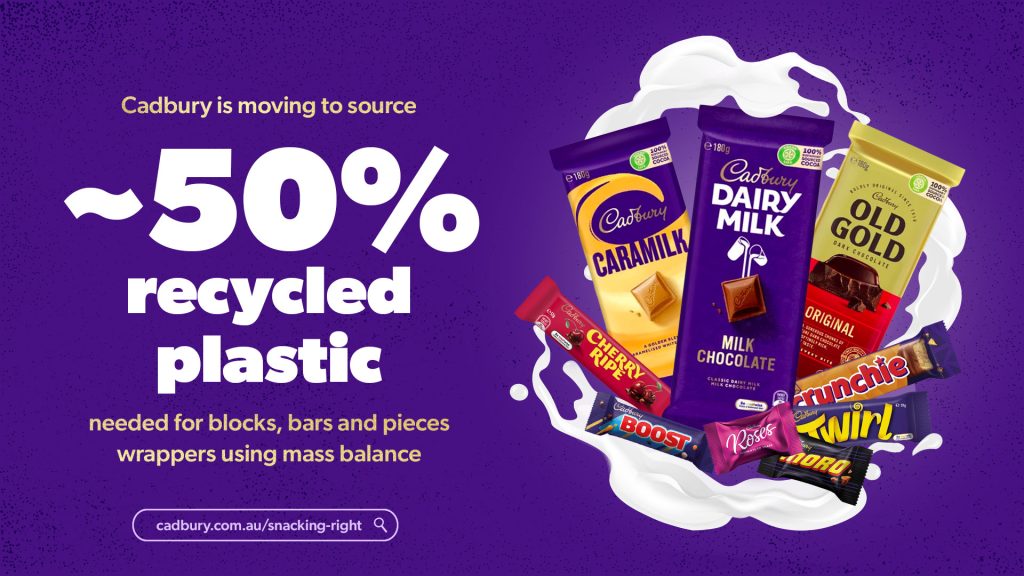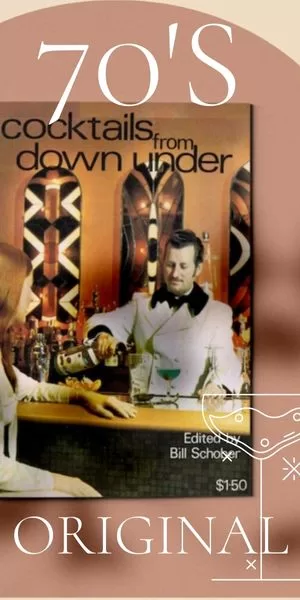-
Secures a deal with Amcor for ~1000 tonnes of post-consumer recycled plastic
-
From April 2024 moves to ~50% recycled plastic packaging across their chocolate blocks, bars and pieces using mass balance^
Australia’s most trusted food and beverage brand* Cadbury has signed a deal with global packaging leader Amcor, to source ~1000 tonnes of post-consumer recycled plastic to wrap its core Cadbury chocolate range, accelerating the company’s ambitions to reduce its virgin plastic needs.
In 2022, Cadbury announced it had sourced ~30% (on a mass balance basis^) of the plastic needed to wrap its 160g to 185g Cadbury Dairy Milk family blocks produced in Australia from recycled materials. With its latest purchase, Cadbury aims to use ~50%# (on a mass balance basis^) recycled plastic for its wrappers across its chocolate blocks, bars and pieces range produced in Australia. This will be equivalent to halving its virgin plastic needs to wrap those products.+
The roll out of recycled material is expected to begin in Q1 of 2024, starting with blocks and expanding into bar lines such as Cherry Ripe, Crunchie and Twirl as well as pieces wrappers for Roses and Favourites.
This announcement comes shortly after Cadbury’s custodian, Mondelēz International, shared its longer-term vision to recycle plastic waste on home soil, partnering with Amcor to invest in Licella to fund the construction of one of the first soft plastic advanced recycling facilities in Australia. The new facility in Melbourne, managed by Advanced Recycling Victoria (ARV), is scheduled for completion in 2025 and will initially process around 20,000 tonnes per annum of end-of-life plastic, with plans to scale up to ~120,000 tonnes per annum.
According to Darren O’Brien, President – Mondelēz International Australia, New Zealand and Japan, “Reducing virgin plastic use and supporting a circular packaging economy is a focus for our business and this latest deal to purchase recycled plastic is another important step in our journey. By creating confidence in the market for recycled material, we’re helping to build a future for plastic recycling in this country.”
“Chocolate lovers love Cadbury Dairy Milk for its generous ‘glass and a half’ slogan, but when it comes to virgin plastic in our packaging, less is more. By halving our virgin plastic needs in our Cadbury chocolate blocks, bars and pieces portfolio produced in Australia, we are on a path to better packaging.”
Mike Cash, President of Amcor Flexibles Asia Pacific, added he’s proud to continue to support Mondelēz International as they strive to be a more sustainable snacking company in Australia and New Zealand. “We partnered with Mondelēz International when they made the first step to move to recycled content for their Cadbury Dairy Milk family blocks packaging, now we’re helping them elevate this ambition by sourcing ~1000 tonnes of recycled plastic to help reduce virgin material across more of the Cadbury chocolate portfolio.”
He added, “Being able to source this significant volume of recycled material for Mondelēz International gives them the opportunity to differentiate and grow and demonstrates the collective commitment of Mondelēz International’s leadership.”
About Mondelēz International
Mondelēz International recognises that packaging waste is a challenge, which is why the company is striving to work with partners across the value chain to help support a circular economy for packaging in Australia.
Through their ‘Light and Right’ packaging strategy, Mondelēz International is aiming to remove unnecessary packaging and simplify packaging materials across the business.
Sustainability is the fourth pillar in the long-term business strategy for Mondelēz International which recognises the role their Snacking Made Right sustainability agenda plays in driving growth and creating value. www.mondelezinternational.com.
About Amcor
Amcor is a global leader in developing and producing responsible packaging solutions across a variety of materials for food, beverage, pharmaceutical, medical, home and personal-care, and other products.
Amcor works with leading companies around the world to protect their products, differentiate brands, and improve supply chains through a range of flexible and rigid packaging, specialty cartons, closures, and services.
The company is focused on making packaging that is increasingly light-weighted, recyclable and reusable, and made using an increasing amount of recycled content.
In fiscal year 2023, around 41,000 Amcor people generated US$14.7 billion in annual sales from operations that span 218 locations in 41 countries. NYSE: AMCR; ASX: AMC
www.amcor.com I LinkedIn I You
* Roy Morgan’s Trusted Brand Award 2023.
^ The sourcing approach used by Mondelēz International for its recycled content, and used by many other companies for many other commodities around the world, is called mass balance. In the case of plastic packaging, mass balance refers to mixing recycled plastic with virgin plastic during the manufacturing of new plastics. This means you can’t trace how much recycled plastic, if any, makes its way into each individual Cadbury product package. Mondelēz International uses ISCC certified material, aligned to a set of sustainability standards. For more on mass balance and ISCC certification, please visit Mass Balance – ISCC System (iscc-system.org)
# The ~50% virgin plastic reduction does not include the mass of adhesives and inks used in the packaging.
+ Based on forecasted 2024 sales volumes and wrappers containing no recycled plastic.


